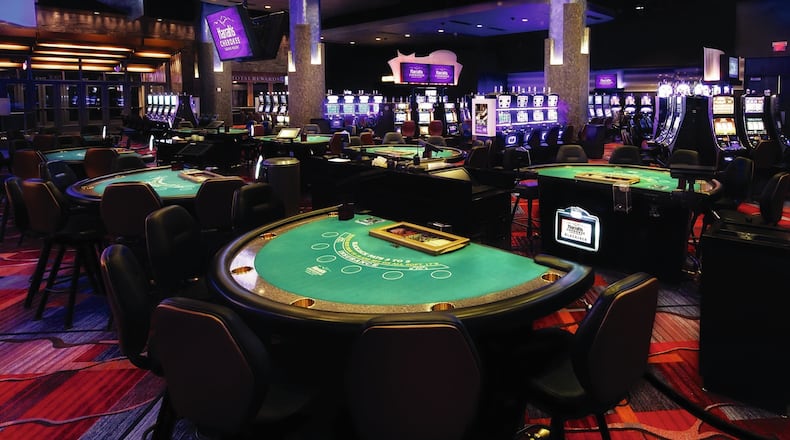They’ve already soaked Georgia taxpayers for hundreds of millions of dollars for stadiums and arena improvements.
Now the heads of Atlanta's four major professional sports teams are back at it, seeking another favor from elected officials: They want state legislators to legalize online and mobile sports betting .
The teams — the Braves, Hawks, Falcons and Atlanta United (the Falcons’ younger and more popular brother) — say they don’t want to pocket any of the gambling proceeds. No, they just think folks wagering on games will be more likely to tune in and watch the festivities.
They want degenerate gamblers’ eyeballs. And with the kind of year the Falcons are having, not to mention the rebuilding the Hawks are likely to have, they’ll take all the viewers they can muster.
The ball teams formed the Georgia Professional Sports Integrity Alliance , which comes after Chicago White Sox fans just celebrated the 100th anniversary of their team throwing a World Series for gamblers.
The teams contend that if you're going to have sports betting — and the U.S. Supreme Court last year proclaimed that states can sanction it — then you might as well have regulated gambling where losers don't have to fear guys with no necks following them.
The teams quoted NBA Commissioner Adam Silver, who once said, “Sports betting should be brought out of the underground and into the sunlight where it can be appropriately monitored and regulated.”
Such a law, the teams say, would “help to eliminate the illegal estimated $1.5 billion market in Georgia, which ranks as the 12th largest state in the country for illegal wagering.”
A couple of points here: It’s always an iffy enterprise to estimate illegal anything. Bookies, chop shops and pot peddlers probably keep good business records, but they’re not so good at disclosing them without a police raid. Also, if Georgia is indeed 12th in the nation in illegal gambling, then our bettors are lagging in their efforts because the state is eighth in population.
You can see there’s a little juice already building behind the legalization effort. House Speaker David Ralston was quoted saying, “There’s a lot of groups out there that are very supportive of sports betting. Tennessee of all places — that’s behind in everything, including football — they passed a sports betting bill in the spring.”
I appreciate the sense of rivalry and the football dig. I know a North Georgia mountain boy like Ralston just couldn't help himself. The Tennessee Volunteers are a disaster and the University of Georgia is a top-ranked college team. But in the pro ranks, the 5-5 Tennessee Titans are in the wild card hunt with a 15% chance of making the playoffs , according to odds makers. The 2-7 Falcons? Less than 1%. Probably far less.
The Atlanta teams' stand on sports betting comes just weeks after a Georgia House special committee met to study whether the state should expand gambling. Currently, the Georgia Lottery brings in about $1.2 billion a year to the wildly popular HOPE scholarships and pre-K classes. But it has been increasingly difficult to increase that pot.
So legislators are looking at casinos, horse racing and sports betting to bring in new cash. The idea of gambling is relatively popular — a 2017 AJC poll found that 56% of Georgians were in favor of allowing casino gambling, with 38% against. Backers have talked about $2 billion in new casino facilities and jobs, jobs, jobs!
It all seems like free money fluttering down from heaven. Sounds great, until you figure that gambling doesn't necessarily create new money. Gambling merely shifts it around , meaning that money spent at casinos won't be spent at local restaurants, movie theaters, or malls to buy junior a new pair of pants.
Much of the time, the money comes from people who can't afford to lose it. Lottery ticket sales show us that. And those betting on sports may follow the same path.
Last year, a poll by the media tech firm Morning Consult found that “21% of respondents said they’re likely to bet on sporting events if the practice becomes legalized in their state.”
But we’re not talking high rollers. Those new bettors would be “younger (38% ages 18-34) and poorer (56% making less than $50,000 per year) than current sports bettors.”
Veteran Republican state Rep. Alan Powell, a chair of the committee studying gambling, says public attitudes have changed greatly since the early 1990s, when creating the lottery was a dicey issue.
“You can hardly go to Sunday school without hearing who people are betting on,” he said. And of the closest betting destination to Georgia, in Cherokee, N.C., “You can hardly get near the casino because of the church buses.”
Credit: HYOSUB SHIN / AJC
Credit: HYOSUB SHIN / AJC
Powell, like many other legislators, thinks the public should be allowed to vote on this issue. It will take two-thirds of the Legislature to put it on the ballot. He, like Ralston and other pols considering the issue, have received campaign contributions from the likes of Atlanta Motor Speedway, which wants to build a $1 billion casino/entertainment complex.
“If the people vote in favor, we’ll only go with destination casinos, we wouldn’t allow those gambling boxes,” he said, referring to those sad, dinky “casinos” seen in truck stops and convenience stores in other states.
Powell, however, thinks the gambling proceeds should flow to health care, not HOPE. The colleges have already gotten fat off the lottery, he said.
That money should go to rural hospitals, he said, and to some sort of fund to bring affordable insurance to the indigent.
I’m betting those same people will be at the craps tables, helping to fund it.
About the Author





